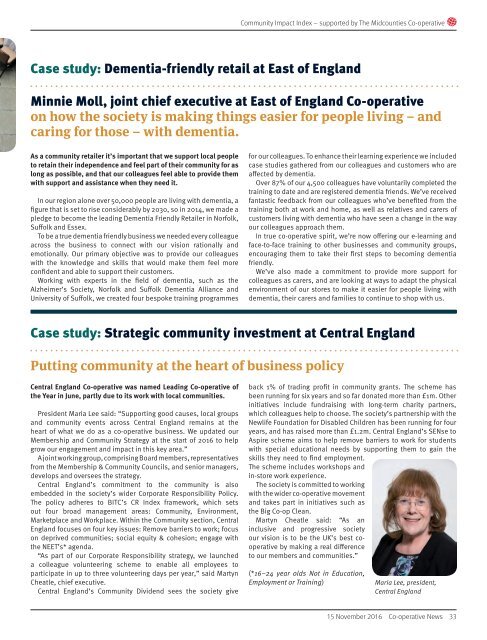impact_index_web
Create successful ePaper yourself
Turn your PDF publications into a flip-book with our unique Google optimized e-Paper software.
Community Impact Index – supported by The Midcounties Co-operative<br />
Case study: Dementia-friendly retail at East of England<br />
Minnie Moll, joint chief executive at East of England Co-operative<br />
on how the society is making things easier for people living – and<br />
caring for those – with dementia.<br />
As a community retailer it’s important that we support local people<br />
to retain their independence and feel part of their community for as<br />
long as possible, and that our colleagues feel able to provide them<br />
with support and assistance when they need it.<br />
In our region alone over 50,000 people are living with dementia, a<br />
figure that is set to rise considerably by 2030, so in 2014, we made a<br />
pledge to become the leading Dementia Friendly Retailer in Norfolk,<br />
Suffolk and Essex.<br />
To be a true dementia friendly business we needed every colleague<br />
across the business to connect with our vision rationally and<br />
emotionally. Our primary objective was to provide our colleagues<br />
with the knowledge and skills that would make them feel more<br />
confident and able to support their customers.<br />
Working with experts in the field of dementia, such as the<br />
Alzheimer’s Society, Norfolk and Suffolk Dementia Alliance and<br />
University of Suffolk, we created four bespoke training programmes<br />
for our colleagues. To enhance their learning experience we included<br />
case studies gathered from our colleagues and customers who are<br />
affected by dementia.<br />
Over 87% of our 4,500 colleagues have voluntarily completed the<br />
training to date and are registered dementia friends. We’ve received<br />
fantastic feedback from our colleagues who’ve benefited from the<br />
training both at work and home, as well as relatives and carers of<br />
customers living with dementia who have seen a change in the way<br />
our colleagues approach them.<br />
In true co-operative spirit, we’re now offering our e-learning and<br />
face-to-face training to other businesses and community groups,<br />
encouraging them to take their first steps to becoming dementia<br />
friendly.<br />
We’ve also made a commitment to provide more support for<br />
colleagues as carers, and are looking at ways to adapt the physical<br />
environment of our stores to make it easier for people living with<br />
dementia, their carers and families to continue to shop with us.<br />
Case study: Strategic community investment at Central England<br />
Putting community at the heart of business policy<br />
Central England Co-operative was named Leading Co-operative of<br />
the Year in June, partly due to its work with local communities.<br />
President Maria Lee said: “Supporting good causes, local groups<br />
and community events across Central England remains at the<br />
heart of what we do as a co-operative business. We updated our<br />
Membership and Community Strategy at the start of 2016 to help<br />
grow our engagement and <strong>impact</strong> in this key area.”<br />
A joint working group, comprising Board members, representatives<br />
from the Membership & Community Councils, and senior managers,<br />
develops and oversees the strategy.<br />
Central England’s commitment to the community is also<br />
embedded in the society’s wider Corporate Responsibility Policy.<br />
The policy adheres to BITC’s CR Index framework, which sets<br />
out four broad management areas: Community, Environment,<br />
Marketplace and Workplace. Within the Community section, Central<br />
England focuses on four key issues: Remove barriers to work; focus<br />
on deprived communities; social equity & cohesion; engage with<br />
the NEET’s* agenda.<br />
“As part of our Corporate Responsibility strategy, we launched<br />
a colleague volunteering scheme to enable all employees to<br />
participate in up to three volunteering days per year,” said Martyn<br />
Cheatle, chief executive.<br />
Central England’s Community Dividend sees the society give<br />
back 1% of trading profit in community grants. The scheme has<br />
been running for six years and so far donated more than £1m. Other<br />
initiatives include fundraising with long-term charity partners,<br />
which colleagues help to choose. The society’s partnership with the<br />
Newlife Foundation for Disabled Children has been running for four<br />
years, and has raised more than £1.2m. Central England’s SENse to<br />
Aspire scheme aims to help remove barriers to work for students<br />
with special educational needs by supporting them to gain the<br />
skills they need to find employment.<br />
The scheme includes workshops and<br />
in-store work experience.<br />
The society is committed to working<br />
with the wider co-operative movement<br />
and takes part in initiatives such as<br />
the Big Co-op Clean.<br />
Martyn Cheatle said: “As an<br />
inclusive and progressive society<br />
our vision is to be the UK’s best cooperative<br />
by making a real difference<br />
to our members and communities.”<br />
(*16–24 year olds Not in Education,<br />
Employment or Training)<br />
Maria Lee, president,<br />
Central England<br />
15 November 2016 Co-operative News 33


















